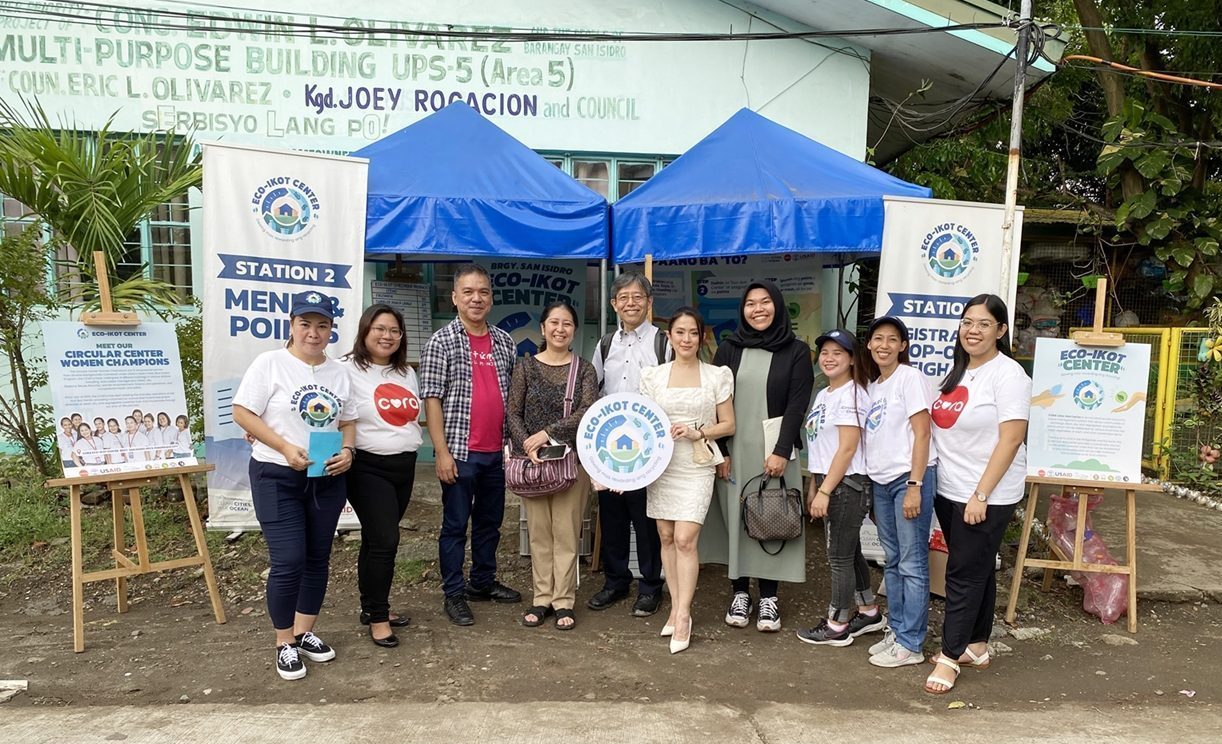Parañaque, Metro Manila, 15 April 2023: In an attempt to learn more about community-based waste management initiatives in the Philippines, the research team of the Regional Knowledge Centre for Marine Plastic Debris visited CORA Eco-Ikot Center, an inclusive holistic recycling centre located in Parañaque, Metro Manila.
Founded by Antoinette Taus, Filipino-American award-winning actor, singer, and Goodwill Ambassador for the United Nations Environment Programme (UNEP), Communities Organized for Resource Allocation (CORA) is committed to creating sustainable programs to help solve global issues. CORA’s projects are centered around volunteerism, community, and inclusivity, and are dedicated to empowering the most vulnerable community members, including women and youth.
CORA established the Eco-Ikot Center in partnership with the local government of Barangay San Isidro, the Parañaque City Environment and Natural Resources Office (CENRO), Our Lady of Unity Parish, and the Homeowners’ Association of United Parañaque.
How the centre works
The centre encourages San Isidro community members to bring their clean and dry plastic waste to the center. The plastics are then weighed by the CORA Eco-Ikot team to calculate the points based on the amount collected. The members can redeem the points for various incentives such as rice, vegetables, e-cash, and other items. Meanwhile, the collected plastics are sent to partner companies such as Sentinel to be recycled into new products.
‘The Philippines contributed a lot to plastic waste generation. Around 164 million pieces of plastic sachets were disposed of daily in the country. Our centre wants to help address this issue,’ said Antoinette Taus, who is also the Executive Director of CORA.

The list of items community members can redeem for
This woman-led recycling initiative not only prevents solid waste from ending up in landfills but also strengthens the local government system as well as provides tools to empower local community members, especially women. With support from USAID’s Clean Cities, Blue Ocean program (CCBO), CORA recruited 10 women who were then trained on Solid Waste Management (SWM) and the 3Rs (Reduce, Reuse, Recycle) to operate the recycling center. The women operators are known as the Circular Center Women Champions and are currently running the recycling centre at San Isidro’s Materials Recovery Facility.

One of the Circular Center Women Champions weighing plastic bottles traded by the community members at Eco-Ikot Center
‘I believe in the power of women… On one hand, women are vulnerable to the negative impacts of environmental issues. While on the other hand, they play a crucial role in our efforts to solve these issues,’ said Taus, highlighting the strategic role women play in mainstreaming community-based waste management.
The underlying credence has started to show its impact. One of the Women Champions has become the mobiliser of a recycling initiative at her child’s school. The school is now a partner of the Eco-Ikot Center.
The importance of partnership for community-based initiatives
As stated in its mission, CORA believes that partnerships are instrumental in achieving a sustainable future where people and the planet work in harmony. Thus, CORA Eco-Ikot Center has been cooperating with various stakeholders including an international development agency, the local governments, the private sector, as well as educational and religious institutions.
The partnership with Our Lady of Unity Parish is an interesting case. Located next to San Isidro’s Materials Recovery Facility where CEI operates, the church has agreed to support CEI’s efforts to prevent solid waste from entering the landfills. A container made of iron has been placed in the exit way of the church area to collect used plastic waste from drink and food packaging brought by the church members. The accumulated waste is regularly moved to CEI’s facility next door.
‘Community-based waste management is important since plastic pollution itself is a very complex issue and cannot be addressed by a single stakeholder,’ said Ms Ellen Putri Edita, Research Associate at the Regional Knowledge Centre for Marine Plastic Debris who joined the visit.
Also read: No Trash Bins, Hotel Voucher: Some Good Practices in Waste Reduction and Management in Japan
Another interesting case is the partnership between CORA Eco-Ikot Center with San Isidro MRF (Materials Recovery Facility). In the past, the MRF held a program which encouraged community members to collect plastic waste and create “eco-bricks” by filling up used plastic bottles with plastic flakes.
The program successfully gathered a high number of eco-bricks but unfortunately, the supply was not absorbed. CORA Eco-Ikot Centre then showed its commitment to addressing the plastic waste issue by mobilising its staff to take out the plastic flakes from each eco-brick and sent the segregated waste to the recycling centre.

The eco-bricks created by the community members of San Isidro
CORA is well aware of the significance of their work and the urgency to leverage their impact. To achieve this objective, Eco-Ikot Center is currently preparing to scale up its initiative.
‘Our goal is to promote public-private partnerships that involve local stakeholders. We strongly believe that more people helping each other is always better,’ said Taus on CORA’s next step.
Also read: PETValue Philippines Pioneering Bottle-to-Bottle Recycling Facility in the Country

